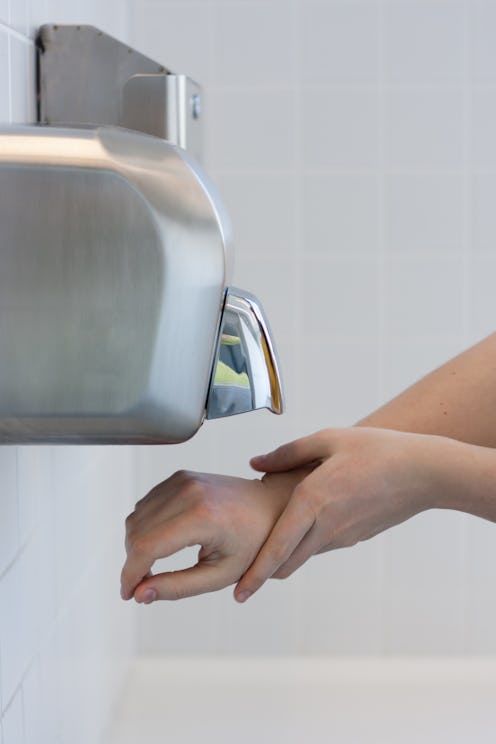News
You've Been Drying Your Hands All Wrong

If public restrooms weren't disgusting enough already, consider this fun fact — the often-used hand dryers spread considerably more bacteria than paper towels, over 100 times more in fact. So not only do you have to worry about what's on the toilet seat, you also have to worry about what's near the hand washing station, as though going to the bathroom outside the comfort of your own home weren't stressful enough already.
In our environmentally conscious state of mind, of course, it can be difficult to justify choosing paper towels over hand dryers after a good hand washing session. After all, the average person uses up to 3,000 paper towels per year in the United States alone, contributing to over 3,000 tons of paper towel waste per day . But new research supports previous findings that suggest in our efforts to be green, we may be becoming unclean. Hand dryers, both the warm air and the high-powered jet variety, send loads of bacteria into the surrounding air, making public restrooms a potential breeding ground for various germs and infectious particles. So as important as washing your hands are, also key to keeping yourself safe from germs is the hand drying method you choose.
According to researchers from the University of Leeds, putting your wet hands under a high powered air dryer could be one of the worst things you do in terms of spreading bacteria around, and by the same token, picking bacteria up. In a statement, the study's lead author Mark Wilcox noted, "Next time you dry your hands in a public toilet using an electric hand dryer, you may be spreading bacteria without knowing it. You may also be splattered with bugs from other people's hands."
Scientists conducted their study by covering study participants' hands with Lactobacillus, a harmless bacteria that isn't commonly found in any public restroom. Their intentions were to recreate a scenario in which improperly washed hands (think not enough soap, not enough time under the water, or just no washing at all) were being dried by various common methods found in public restroom. After having their subjects dry their hands with warm-air dryers, high-powered jet dryers, or the standard paper towel, the researchers took 120 air samples.
Their results were both astounding and somewhat horrifying — the number of Lactobacillus they found in the air near high-powered jet dryers was four and a half times higher than near warm-air dryers. And furthermore, they found 27 times more bacteria near warm-air dryers than in the air surrounding paper towel machines. That means that all considered, high-powered jet dryers left 121.5 times more bacteria in the air than your typical towel dispenser. 121.5 times more bacteria. Yikes.
To illustrate the results more graphically, scientists also had participants cover their hands in paint before drying their hands, creating a rather frightening visual representation of what happens with a hand dryer.
Worse yet, Wilcox and his team found that the bacteria remained in the air for a significant period of time after the dryers had been used. 48 percent of the bacteria they collected was found languishing in the air more than five minutes after the subjects had finished, and 15 minutes later, researchers could still find traces of the bacteria in the air. So not only are you spreading bacteria around, but you're leaving it for the next victim, er, guest, to find.
The logic behind these findings certainly makes sense. As Wilcox said,
While jet air dryers are good at hand drying, they achieve this by using air velocities of about 400 miles an hour... Unfortunately, this means that the dispersed water droplets (containing more or less bacteria/viruses depending on how hands were washed and how contaminated they were in the first place) will be fired longer distances and some will remain suspended in the air for many minutes (possibly hours).
Not only does your hand drying method affect the degree to which you spread bacteria, but what you do with your hands also makes a big difference. In a 2011 study published in the Journal of Applied Microbiology, researchers similarly found that towels were superior to hand dryers when it came to getting rid of bacteria. But this was only true of people who rubbed their hands together under a dryer — if you kept your hands still, dryers were nearly as effective as paper towels in not only getting the water off, but also in removing excess bacteria.
The debate between hand dryers and paper towels has raged on for years, with most scientists ultimately ruling in favor of paper towels, at least when it comes to health and safety. In 2012, a study from the Mayo Clinic noted, "From a hygiene standpoint, paper towels are superior to air dryers; therefore, paper towels should be recommended for use in locations in which hygiene is paramount, such as hospitals and clinics."
But then again, this may all be a moot point, considering evidence from 2013 that suggests only 5 percent of people wash their hands correctly after a bathroom break.
Some experts are not so convinced of this latest study's validity — after all, it was funded by the European Tissue Symposium, a group that makes various tissue products. And coating your hands with bacteria isn't exactly comparable to what normally (hopefully) happens after a trip to the toilet. But regardless, Wilcox's findings are the latest in a string of investigations that provide rather damning evidence of the hidden dangers of the innocuous hand dryer.
So the next time you're in a public restroom, beware the high-powered jet dryer, and make your way to the paper towels instead.
Images: Fotolia; Getty Images (4)